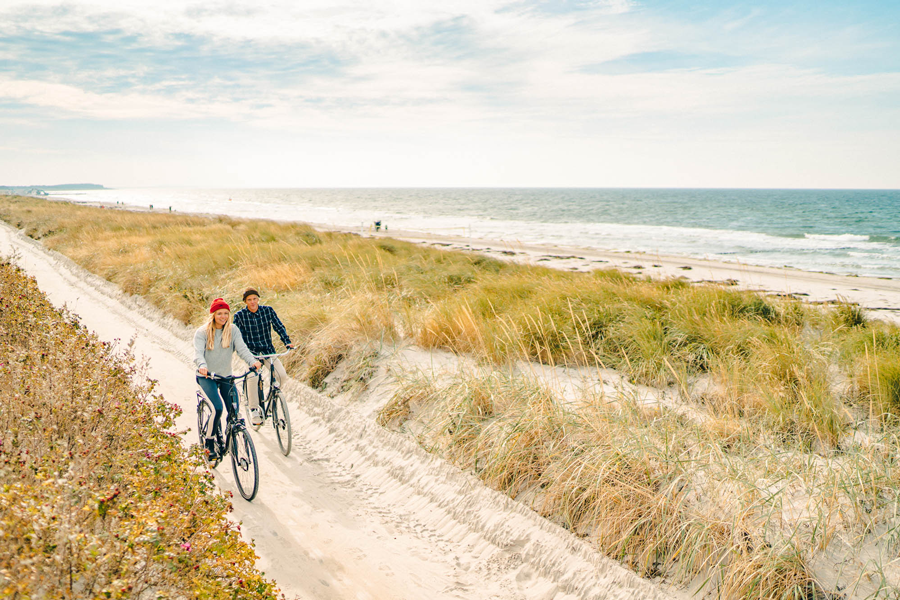Heritage, culture, and active lifestyle are at the core of projects promoting sustainable tourism within the Interreg South Baltic Programme. These projects enhance the transition to community-led sustainable development across borders.
- 06 July 2023

Sustainable tourism is defined by the UN Environment Program and UN World Tourism Organization as “tourism that takes full account of its current and future economic, social and environmental impacts, addressing the needs of visitors, the industry, the environment and host communities.” Sustainable Tourism has been one of the key priorities for Interreg South Baltic Programme (ISBP) 2014 – 2020 and ISBP 2021-2027. The programme has been increasing the development of the South Baltic area’s (SBA) natural and cultural heritage assets into sustainable tourist destinations, while also looking for blue and green tourism services, products and tools that help to increase the number of visits in cultural and natural heritage sites as well as pilot investments in blue and green infrastructure.
Benefitting from the blue and green character of the SBA, tourism is one of the key sectors that determine the viability of small suburban settlements and rural areas. At the same time, the natural conditions of the entire SBA provide opportunities for environmentally sensitive tourism that could extend the tourist season and diversify the currently prevailing tourism patterns. In particular, the protection, preservation and management of the area’s rich and diverse natural and cultural heritage offers new perspectives for their sustainable use and development. The Interreg South Programme 2014-2020 has supported 15 projects with resources from the European Regional Development Fund (ERDF). They involve cooperation activities in sustainable tourism, thereby contributing to the designing, learning and implementation of a wide array of projects in Sustainable Tourism in the South Baltic area. Here is a short overview of some of the projects managed by the Interreg South Baltic Joint Secretariat.
Nature and Cultural Heritage
- ArchaeoBalt cultivated profitable green and blue touristic Archaeoroute by connecting universities, museums, and touristic industry, allowing the integration of existing idea, improving already present routes and the development of the Archaeotouristic offer in general.
- DUNC worked on behalf of the World Heritage sites across the SBA to connect people and develop tourism strategies that help build inclusive communities, provide sustainable economic growth, and safeguard heritage assets for future generations.
- BALTIC STORIES achieved the professionalisation of events organised across the SBA by educating and putting at the disposal of events organisers a set of tools and guidelines, as well as providing professional marketing support, pilot implementation and training activities, contributing natural and cultural heritage areas/sites as sustainable tourism destinations.
- Baltic Heritage Routes generated the design, elaboration, and implementation of eight heritage routes, resulting in the use of new routes by tourists, wider interest in blue and green tourism, and the growth of number of vacation plans.
- Baltic Pass designed sailing paths, considering maritime heritage of the whole South Baltic region, and combining sailing with visiting attractive places on the southern shores of Baltic Sea in different countries.
- BalticMuseums: Love IT! Created a multilingual mobile app that enable tourists to visit museums independently and at their own pace, allowing them to become more involved in sightseeing and encourage new visits.
- BSTC created a cross-border service unit, the “Baltic Sea Tourism Center,” an umbrella organisation for tourism stakeholders throughout the Baltic Sea Region that combines different services and actors in the field of sustainable tourism development, providing a platform for communication and cooperation.
Rural and Coastal Regeneration
- SOUTH BALTIC MANORS created joint marketing and promotion for manor tourism around the South Baltic’s coasts.
- Fish Markets launched a platform for announcing local fish markets and a strategy for the development of local fish markets.
- CATCH fostered the capability of coastal communities to establish sustainable angling tourism, delivered improved measures for touristic providers and combine an information and knowledge platform on coastal angling tourism, providing information for tourists and locals necessary for planning, booking, and performing an angling trip to unique coastal sites.
Wellbeing and Active Tourism
- SB WELL developed a roadmap for developing, delivering, branding, and promoting sustainable wellbeing tourism in the SB region. It set guidelines/criteria for wellbeing tourism in the SB region and good practices,created a cross-border interactive wellbeing atlas and produced pilot sites for wellbeing & promotion.
- Biking South Baltic! founded a promotion website of the EuroVelo No. 10 going from Copenhagen to Gdansk and a strategy for the development of the EuroVelo route No. 10 for the years 2020-2023.
- South Coast Baltic strengthened the attractiveness of the cross-border boating region through establishing a comprehensive cross-border destination management which would combine joint marketing with improvements of boating services and infrastructure.
- JOHANN created necessary information to attract small cruise ship businesses to the small city ports in the SBA, such as: Training Manual Cruse Port Management – Land Side and Water Side, Port Handbooks, Cruse Port Benchmark Study, Cruise Marketing Strategy.
